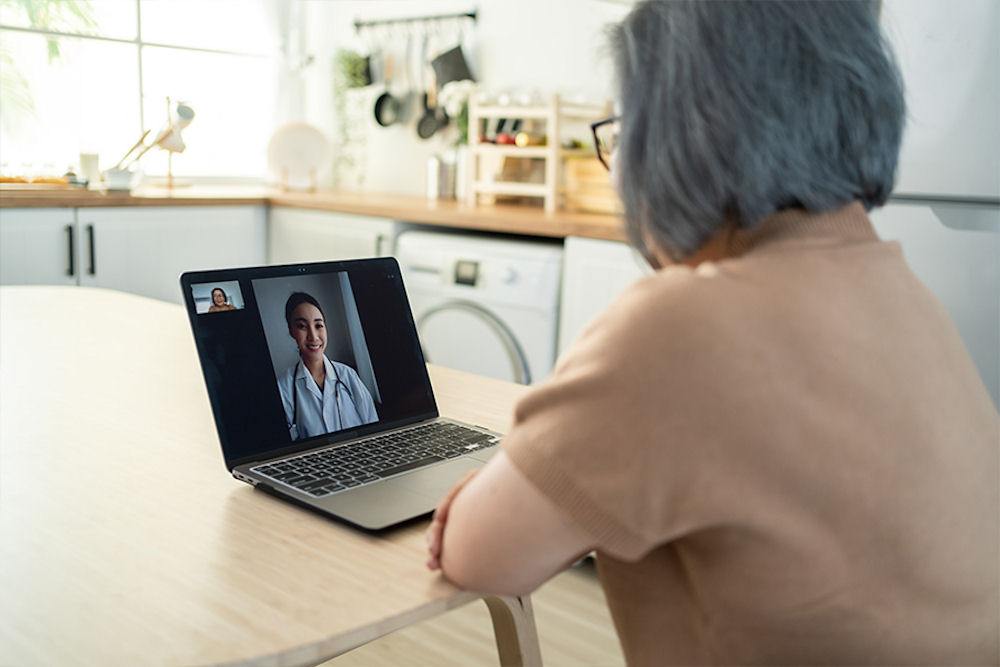Addiction recovery has always required courage, community, and commitment. But in today’s digital age, we can now add technology to that list, offering real-time tools for connection, reflection, and support. Whether you’re just starting your recovery journey or maintaining long-term sobriety, advancements in technology in addiction recovery are providing new ways to stay engaged, track progress, and connect with support – anytime, anywhere.
At Northern Illinois Recovery Center in Crystal Lake, Illinois, we believe healing is deeply personal and constantly evolving. And we also know that one size never fits all. That’s why we stay informed on emerging tech that can enhance addiction treatment, not replace it, giving our clients even more tools to rebuild their lives on solid ground.
Let’s take a closer look at how technology in addiction recovery, such as apps, artificial intelligence, wearable tech, and virtual support communities, is changing the landscape of recovery, for good.
Mobile Apps for Recovery: Sobriety in Your Pocket
When it comes to staying on track, addiction recovery apps are like having a personalized support system in your pocket – offering structure, encouragement, and reminders when you need them most. These tools offer a wide range of features that can complement clinical care, peer support, and self-reflection between therapy sessions.
Apps like I Am Sober, Sober Grid, and Nomo allow users to track their sober days, receive inspirational quotes, and reflect on common triggers or habits. Visual progress, especially when paired with personal notes and reminders, can be a powerful motivator, particularly in early recovery when confidence may still be building.
Many apps provide journaling features that allow users to log emotional patterns, cravings, and situational triggers in real-time. This kind of day-to-day insight can help individuals and clinicians better understand the root causes of substance use and provide a clearer path to healing during sessions or personal reflection.
Digital goal-setting tools help users define milestones, create achievable steps, and celebrate small wins along the way. Some apps even offer peer-to-peer encouragement or sponsor-style check-ins built into the platform, which can offer real accountability and motivation outside of structured therapy.
Certain recovery apps include quick-access emergency features, allowing users to instantly reach out to helplines, sponsors, sober peers, or nearby treatment centers when a crisis hits. Having this kind of backup in your pocket can make all the difference when managing unexpected cravings or emotional triggers.
Tech Tip: NIRC clients often pair traditional outpatient or IOP services with one of these recovery apps for daily check-ins, reflections, and supplemental motivation between appointments.
AI in Addiction Recovery: Smart Tools for Personalized Healing
Artificial intelligence isn’t just for self-driving cars and virtual assistants – it’s transforming how we approach mental health and substance use treatment, helping providers and individuals make more informed, personalized decisions. By analyzing patterns and behaviors in ways the human eye might miss, AI in addiction recovery is becoming a game-changer for relapse prevention and tailored care.

Predictive Analytics and Relapse Prevention
AI-powered systems can now process and interpret vast amounts of behavioral data to predict relapse risks with surprising accuracy. By identifying shifts in mood, sleep quality, social engagement, and even language used in texts or social media posts, these tools can flag when someone may be in danger of slipping.
When integrated into a recovery plan, these insights allow for early intervention, sometimes days or even weeks before a relapse might occur. This can empower providers, sponsors, or loved ones to reach out with support before a crisis unfolds, potentially saving lives.
Chatbots and Digital Companions
AI chatbots are emerging as powerful tools in the realm of emotional regulation and crisis support. These virtual companions are available 24/7, offering anonymous conversations, coping strategies, and grounding exercises that can help users navigate anxiety, cravings, or moments of emotional overwhelm.
While they aren’t meant to replace licensed therapists, they offer something uniquely valuable: immediate access to support at any hour, which can be especially helpful for those feeling isolated, ashamed, or unsure about seeking help in person.
Think of them as digital lifelines, calm voices in the storm, providing comfort in the moments it’s needed most.
Customized Treatment Plans
Some advanced treatment centers are now using AI software to create highly personalized care plans. By analyzing a person’s mental health history, substance use patterns, trauma background, and even genetic markers (where available), these systems can generate data-informed recommendations for therapy modalities, group types, medication options, and relapse prevention tools.
This tailored approach allows clinicians to go beyond a one-size-fits-all model, providing truly client-centered care that evolves with the person’s changing needs.
Smart Recovery Tip: At NIRC, we believe in integrating innovative tools like AI to support, but never replace, the human connection and clinical expertise that real healing requires.

Virtual Support Groups and Online Communities
Connection is a cornerstone of recovery, and today’s digital landscape offers more ways than ever to connect, share, and heal, no matter where you are or what time it is. From online meetings to peer forums and professional telehealth, virtual support can fill the gaps between traditional care and real life.
Platforms like Zoom and In The Rooms have made it possible to attend Alcoholics Anonymous (AA), Narcotics Anonymous (NA), and Al-Anon meetings from anywhere in the world. Whether someone lives in a rural area, lacks reliable transportation, or prefers nighttime support, these platforms remove common barriers and offer real-time connection.
These meetings proved especially vital during the COVID-19 pandemic and remain a lifeline for those experiencing social anxiety, mobility challenges, or unpredictable schedules. With the same structure, fellowship, and accountability as in-person meetings, they allow people to stay actively engaged in their recovery journey without needing to leave home.
Apps and websites like Reddit’s r/StopDrinking or Soberistas offer anonymous, judgment-free spaces where people in recovery can ask questions, celebrate victories, or process setbacks. These communities often run 24/7, giving individuals access to peer connection even when traditional support systems are unavailable.
This type of shared experience and empathy can be life-changing, especially during the vulnerable early stages of sobriety, when feelings of isolation, guilt, or shame are most intense. For many, these platforms become safe havens for building resilience and finding belonging.
Many treatment centers, including Northern Illinois Recovery Center in Crystal Lake, IL, offer teletherapy and virtual counseling sessions, making mental health support more accessible, flexible, and convenient. This is especially helpful for clients transitioning from inpatient care, those balancing work or family responsibilities, or individuals who feel more comfortable speaking with a therapist from their own space.
Online therapy is just as effective as in-person sessions, with the bonus of increased privacy, scheduling ease, and a greater sense of autonomy. It’s also a powerful way to maintain continuity of care, so no progress gets lost between steps of the recovery journey.
Wearable Devices and Smart Tracking
Fitness trackers and smartwatches are no longer just about counting steps. When integrated into a recovery plan, wearable technology can offer insights that support physical, emotional, and mental health.
Monitoring Sleep and Stress Levels
Sleep and stress are two of the most important (and overlooked) aspects of recovery. Devices like Apple Watch, Fitbit, or Oura Ring provide data that can help users identify patterns and adjust their routines accordingly.
Heart Rate and Breath Work Tools
Some wearables prompt users to pause for breathwork or mindfulness exercises when elevated stress or anxiety is detected. These proactive nudges can help someone prevent a spiral before it begins.
Exercise and Endorphins
Regular movement supports both physical and emotional recovery. Wearables can gamify fitness goals, helping to release feel-good chemicals that act as natural mood boosters and craving reducers.
Technology as a Tool – Not a Replacement
While these digital tools are powerful, they’re not meant to replace evidence-based treatment or the human relationships that foster true healing. At Northern Illinois Recovery Center, we encourage our clients to use technology as a supplement, not a substitute, for:
- Group therapy and peer interaction
- Individual counseling
- Medical detox and medication-assisted treatment (MAT)
- Family involvement and education
- Holistic healing modalities like art, yoga, or meditation
What’s most important is using a recovery plan that fits your life – and today, that might include both in-person therapy and virtual connection, or both medication management and a mindfulness app.
Finding Balance in a Digital World
One thing we often remind clients: technology can help or hinder, depending on how it’s used.
Social media, news notifications, and even recovery forums can become overwhelming. Setting healthy boundaries with tech, such as digital detox time, muting toxic content, or limiting screen time, is just as essential as adding the right tools into your recovery toolkit.
The goal isn’t to escape reality with tech – it’s to use it to stay grounded in your recovery.
Real-Life Stories: Technology in Action
We’ve seen firsthand how clients have used tech to support their recovery journeys:
- Matt, a 24-year-old college student in outpatient treatment, uses a sobriety app to journal cravings and track moods between sessions. His therapist reviews the data weekly to spot patterns and offer tailored support.
- Laura, a working mom in early recovery, joins three virtual NA meetings per week and uses a meditation app each morning before work to stay centered.
- James, a Marine Corps veteran, wears a smartwatch to track his stress levels and schedule breathing exercises before social events that might trigger anxiety.
These aren’t rare cases, they’re becoming the new normal.
Start Your Tech-Enhanced Recovery with NIRC
If you or someone you love is ready to begin the path to recovery, Northern Illinois Recovery Center is here to walk with you every step of the way. We integrate modern tools with proven therapies to support real, lasting change.
Whether you need in-person care, virtual options, or help finding recovery-friendly apps and support groups, we’re here to tailor a plan that fits your life and goals.
Call us today. The future of recovery is here, and it includes you.





